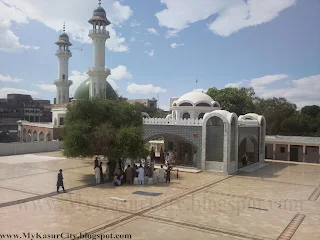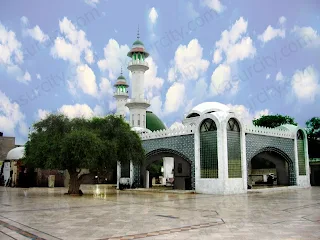Introduction:
Hazrat Bulleh Shah (حضرت بلھے شاہ) real name was Hazrat Abdullah. He was born in 1680 in a Syed family in a village "Uch" near Bhawalpur. Balhe Shah was a Sufi poet of Punjab. During his reign, the paganism of Punjabi Sufism reached its peak.
He used to lived in Kasur and was later buried outside Kasur in 1757 (now the centre of Kasur city). Hazrat Bulleh Shah's father was Shah Muhammad Darwish who was an expert in Arabic, Persian and Quran. Baba Bulleh Shah was a great philanthropist, philosopher, rebel, internationalist, teacher and Sufi poet of all times.
 |
| Syed Bulleh Shah |
Teacher/ مرشد of Hazrat Bulleh Shah:
He was the disciple of Enayat Shah Lahori, who himself was a great Sufi of his time. Sufi Shah Inayat Qadiri was belongs to the Arain tribe of Lahore. Hazrat Bulleh Shah was also student of Molala Mohi ud Din.
Baba ji was born in a noble and aristocratic Syed (سید) family but, as a result of Hazrat Enayat’s teachings, he left the life of nobility and luxury and led quite simple and humble life. Leaving his luxurious life, Bulley Shah described it in poetry like this
Punjabi:
چل بلھیا چل اوتھے چلیے جیتھے سارے انے
نہ کوئی ساڈی زات پچانے نہ کوئی سانوں منے
Hindi:
चल बल चल्या चल उठे उठे चले ज़े सारे अने
पकाने के लिए कोई सादी जात नहीं, कोई साँ मने नहीं
Chal Bulya chal uthe uthe chale Jethy saare ane
Na koee saadee jaat Pachany, Na koi sanu mane
Translation:
In this poem, Bullay Shah says that let's go to where everyone is blind so that no one can reach us or respect us just because of our caste and our status.
Childhood:
When he was six months old, his parents moved to Malkwal (a
village near district Sahiwal, Punjab, Pakistan). His father later got a job in
a paddock, 50 miles southeast of Kasur. Balhe Shah received his primary
education in Pandok and went to Kasur for higher education. He received
education from Maulana Mohiyuddin (محیٰ الدین) and Shah Anayat.
Young age:
Hazrat Bullah Shah was a strong supporter of the poor and on
every front he opposed oppression and exploitation of the people by the
capitalist class. Due to his anti-extremism and revolutionary attitude, some of
so called religious personalities of that time gave him the fatwa of Kafir (کافر).
Several times he was bitten by extremists but 'he never bowed his neck'.
During that period, Baba Balhey Shah stood as a beacon of hope and peace for the people of Punjab. When Hasrat Bulleh Shah was in Pandoke, A young Sikh Man was allegedly killed by the Muslims while passing through Muslims village, in retaliation for the killing of some Muslims by the Sikhs. Baba Bulleh Shah denounced the murder of an innocent Sikh and was censured by the so called Mullas (ملا) and muftis (مفتی) of Pandoke.
Bulleh Shah said that the answer to violence is not violence. Bulleh Shah also honoured the ninth Sikh Guru, Guru Tegh Bahadur, as a Ghazi, or "religious warrior", causing controversy among that time Muslims.
Death (دنیا فانی سے پردہ)
Bulleh Shah died in 1757 in Kasur. According to history, the so-called scholars of that time considered Bulleh Shah an infidel and forbade the local Imams from performing his funeral. he was buried outside the boundary of Kasur because he wasn’t allowed to bury in the Kasur.
ٓThere are some traditions that the population of that time protested that Bulleh Shah should not be buried in the Muslim cemetery. Therefore, a eunuch (Shemale) led the funeral of Balhe Shah, the eunuch carried the funeral of this great poet two miles outside Kasur city and buried him.
But as the time passed,
with the increase in population, Kasur also expanded and thus, at last, Baba
ji’s grave got its place in the center of Kasur city.
Poetry:
Baba ji was a greatest poet of all the time and often sing his poetry in Kasur's (قصور) streets. No doubt, a lot of heart touching Bulleh Shah poetry have been disappeared
from the world but still we’ve his many beautiful poetry which are famous all
over the world and this great poet of history is loved and admired by people of all castes and religions.
Bulleh Shah lived in the same period as the Sindhi Sufi poet Shah Abdul Latif Bhatai (1689–1752). He also lived with such famous figures as the Punjabi poet Waris Shah (1722–1798), who was famous for his work "Heer Ranjha", and the Sindhi Sufi poet Abdul Wahab (1739–1829), widely known by his pseudonym Sachal Sarmast. Known by the name Bulleh Shah's residence in the field of Urdu poetry was 400 miles away from the residence of Mir Taqi Mir (1723-1810) of Agra.

Balhe Shah followed the Sufi tradition of Punjabi poetry
established by poets such as Shah Hussain (1538-1599), Sultan Bahu (1629-1691)
and Shah Sharaf (1640-1724).Balhe Shah's poem is primarily called Kafi, a style
of Punjabi, Sindhi and Saraiki poetry used not only by Sufis of Sindh and
Punjab but also by Sikh Gurus. Balhe Shah's writings present him as a
philanthropist, someone who provides solutions to the social problems of the
world around him while he is going through it, describing the turmoil. What his
motherland Punjab is going through, at the same time in search of God.
His poetry highlights his mystical spiritual journey through
the four stages of Sufism: Shariat (the path), Tariqat (conformity), Haqit
(truth) and Marifat (unity). The simplicity with which Balhe Shah has been able
to address complex fundamental problems of life and humanity is a major part of
his appeal.
According to Bulleh Shah, Whoever met the Allah did so by
traveling on this path and whoever achieved this encounter will achieve it by
being a traveler on this path of love. The life and writings of Balhe Shah are
full of subtle secrets of the path. These upheavals not only strengthen the
love of a true lover (عشق حقیقی) but also motivate him to go through the
toughest difficulties to reach his spiritual goal. The life and compositions of
Balhe Shah will serve as a beacon for the true seekers of spiritual realization
of the ancestors.
After the death of Baba Bulleh Shah, the Government and
Muslim Ulmas used their force strongly to destroy the Kalam (poetry) and
reputation of Baba ji. Qawals (Asian classical singers) were strictly
prohibited to sing the Kalam of Baba ji publicly.

In British India, for about 100 years his Kalam was not
allowed to be published. It was after the ‘partition of 1947’ that Baba ji’s
Kalam was published for the first time, when some Sikhs and Hindus disclosed
some remnants of Baba ji’s Kalam.
As such, many have set his rhymes to music, from renowned
street singers to UK-based Sufi singers such as Nusrat Fateh Ali Khan, Pathane
Khan, Abida Parveen, Wadali Brothers and Sain Zahoor. From Asian Synthesized
Techno Qawwali Remix. Performers of Pakistani rock band Junoon.
In the 1990s Junoon, a rock band from Pakistan, rendered his
poems Bullah Ki Jaana and Aleph (Ilmon Bas Kareen O Yaar).
In 2004, Rabbi Shergill turned the abstruse metaphysical
poem Bullah Ki Jaana into a rock/fusion song that gained popularity in India
and Pakistan.
The Wadali Bandhu, a Punjabi Sufi group from India, have
also released a version of Bullah Ki Jaana in their album Aa Mil Yaar... Call
of the Beloved. Another version was performed by Lakhwinder Wadali and entitled
Bullah.
Dama Dam Mast Qalandar, a qawwali composed in honour of
Shahbaz Qalandar, has been one of Bulleh Shah's most popular poems and has been
frequently rendered by many Indian, Pakistani and Bangladeshi singers including
Noor Jehan, Ustad Nusrat Fateh Ali Khan, Abida Parveen (kalam bulleh shah by abida parveen), Sabri Brothers, Wadali
brothers, Reshman, Runa Laila, and Arieb Azhar.
Some of his poetry and its explanation is as under
Bulleh Shah poetry in Punjabi:
اٹ کھڑکے دکڑ وجے تتا ہوئے چلا
آن فقیر تے کھا کھا جاون تے راضی ہوئے بلھا
Bulleh shah poetry in Hindi
अत खक्कडके डकर वाजे टाटा होय चल
एक फकीर ते ने कहा जावन ते राजी होय बलहा
Att khakkadake dukar vaaje taata hoy chula
Aan phakeer te ne kaha jaavan te raajee hoy Bhulla
Translation: Balhe Shah
says in his poem that when two bricks/stones are rubbed together and the fire
is lit and the stove is heated. When the food is cooked and poor people come
and eat, this make me (Bulleh Shah) happy.
پڑھ پڑھ علم ہزار کتاباں
اپنا آپ نہ پڑھیا
!
جا جا وڑھدا مندر مسجد
من اپنے چے نئیں وڑھیا
!
لڑدے رئے ہو نال شیطاناں
نئیں نفس اپنے نال لڑیا
!
پہلاں اپنے آپ نوں پڑھ
فیر مندر مسجد وڑھ
!
جدوں نفس جاوے تیرا مر
فیر نال شیطاناں لڑ
!
Translation:
So first correct yourself and do your studies and then go to temple mosque for worship. When your "Nafas"/نفس dies, then fight against evil from Satan.
Shrine:
Shrine of Hazrat Bulleh Shah is located at Railway road,
City Kasur. Kasur is a district located at south of Lahore (about 50 KM using
Main Ferozpur road). His tomb attracts thousands of pilgrims from the region, Shrine Hazrat Bullay Shah consist of a Mosque and a tomb. The place where Shrine is located, it is a centre of Kasur city. There is a proper place for parking for the visitors. Strict security arrangements have been made here.
 |
| Mosque Shrine Hazrat Bulleh Shah |
Urs:
Today, a large festival (urs) is celebrated at the tomb
every year. Urs is celebrated every year at the end of August in which pilgrims not only from Pakistan but also from all over the world participate. Food is also arranged for the visitors during this time. Security and other arrangements are made by the district administration and the district police. The court is very well decorated. Major political and social personalities of Pakistan participate in Urs celebrations.
 |
| Urs Hazrat Bulleh Shah Kasur, Punjab, Pakistan |
Images :
.jpeg) |
| Darbar Bulleh Shah |
.jpeg) |
| Shrine during Urs Mela |
 |
| Night View of Shrine |
 |
| Tomb Hazrat Bulleh Shah - Kasur |

 |
| Night View bulleh Shah Mosque Kasur |
 |
| Mazar Syed Bulleh Shah (Abdullah) |
 |
| Mela at Tomb Bulleh Shah Kasur |
 |
| دربار بلھے شاہ |
 |
| दरगाह बुल्ले शाह |
